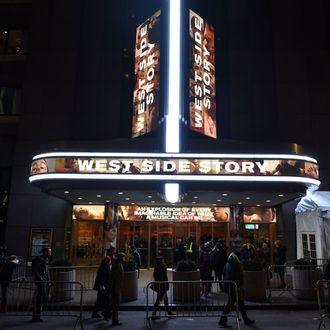
As the coronavirus continues to spread across the world, shutting down or postponing many major cultural events in the process, Broadway is going on with the show, but for now, some shows are enticing audiences with cheaper tickets. Producer Scott Rudin, who’s behind the marquee Broadway productions of West Side Story, To Kill a Mockingbird, The Lehman Trilogy, Who’s Afraid of Virginia Woolf, and The Book of Mormon, has announced that all remaining tickets to all performances from March 12 through March 29 of these shows will be offered for $50, beginning Thursday at 12 noon. “As long as New York City is open for business, its beating heart remains the Broadway stage,” Rudin said in a statement. “This is an unprecedented opportunity for everyone to see a show that they otherwise might not have had easy and affordable access to. I can’t pretend that great theater is the panacea we’ve been waiting for, but in the meantime I think we could all use a few hours away from the evening news.”
On March 2, industry organization the Broadway League first put out a statement on the disease, saying that it was working with elected officials to strategize and that business would continue. On March 6, it followed up, saying that it had increased the frequency of cleaning in theaters, made hand sanitizer available to the public in lobbies and restrooms, and encouraged anyone with flulike symptoms to stay home. In a revised statement, posted today, the League said that “as an added precaution, we are highly recommending that all stage door activities be eliminated for the time being.”
Some productions have taken their own specific measures: Hadestown and several other shows already stopped having cast members greet fans at the stage door after the show; Disney Theatricals, whose shows draw heavily from the tourist crowd, has waived exchange fees and made refunds available to guests holding tickets through April 19. Business-wise, as the New York Times has reported, the insurance plans for most theatrical venues might cover a forced closure by the government, but may not cover voluntary closures due to disease concerns. So financially, there’s an incentive to keep places open, even if people may be less enthusiastic about coming.


